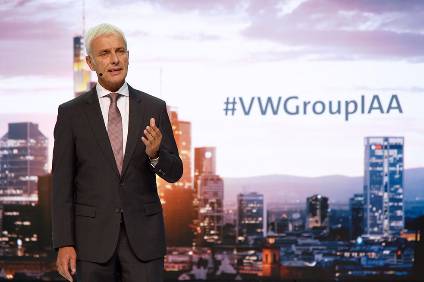An extraordinary week that culminated last night with the expected news that Volkswagen was restructuring the group and tossing out the long-serving chairman and CEO Matthias Mueller, a company ‘lifer’ who was handed the task of steering the company through the diesel crisis and setting it on a new path.
This was telegraphed on Tuesday in an equally extraordinary press release from VW which said: “Volkswagen AG considers a further development of the management structure of the group, which would also be associated with personnel changes in the board of management and with changes in the specific responsibilities of the board of management members. This could also include a change in the position of the chairman of the board of management. On the basis of these considerations, the chairman of the supervisory board [of VAG] is currently in discussions with certain members of the supervisory board and of the board of management. Matthias Mueller showed his general willingness to contribute to the changes. It is currently open whether the considerations and discussions will lead to a further development of the management structure or to personnel changes in the board of management of [VAG].”
That led our Dave Leggett to pen an opinion piece: “Matthias Mueller clearly played an important part in steadying the ship – a ‘safe pair of hands’. A caretaker manager, perhaps. The right man at the right time. He was/is a VW Group insider (a ‘lifer’), but was highly regarded for his work at Porsche. An engineer and technocrat, he led a strategy to rebuild shattered confidence at VW and set the group on a strategic path to face the big challenges ahead. Is electrification ‘greenwash’? It’s an easy accusation to make, but Volkswagen Group is putting in place a new product development and manufacturing strategy to address e-mobility. It doesn’t appear to be off the pace, far from it.
“Electrification, though, is an expensive business. It will put a higher stake on scarce investment resource and puts added focus on cost management elsewhere. There is a feeling among some analysts and investors that this is where Mueller increasingly looked less likely to be effective than another executive – the head of the VW brand, Herbert Diess. He is said to have a reputation for being very on top of cost control. He also came to Volkswagen from BMW in 2015, so is not subject to the ‘insider’ suspicions that sometimes get whispered concerning Mueller (who was a senior manager in product development at the time illegal software was being developed).”
That view was supported by one columnist I read regularly who said a tough cost controller was just what VW needs right now. I do wonder how the Germans toss top execs out. Was Mueller marched to the door in Wolfsburg carrying a plastic bag containing the contents of his desk? I think it might have been a bit more civilised than that [we have since learned his contract continues to agreed end date – he earned EUR10m last year – ed]. Certainly there were loads of effusive thanks in the press release announcing his termination and again in a televised presser from Germany this morning. He’s 64 and had two years left on his contract. I’d like to think, at the time of writing, he’s in his favourite lunchplace, a large stein at hand, a cheque with a considerable number of noughts on it in his pocket, and cruise brochures spread across the table. “Thank goodness that’s over, time to enjoy my hard-earned retirement.”
Away from Wolfsburg’s Night of the Long Knives, I was surprised at the popularity of a couple of stories from my native Antipodes – news of Toyota New Zealand’s restructuring of its dealer network to an agency basis and an interview, kindly supplied by TNZ, with the CEO. Closer to home, VW – them again – created a Holistic User Experience (HUX) division, Kyocera went to court over haptic technology and Ford announced its redesigned Focus, destined, pretty much, for global sale. This is the one that’s going to be built in China for the US, Trump tariffs permitting, but no longer in Thailand for Asia Pacific which will now get theirs from Germany while the Thai plant focuses (sorry) on the Ranger light truck that tops many sales charts down there. Looks like a nice car though much of the vaunted tech on Fords usually ends up costing extra for the first year or two.
Another chapter in the long-running Takata airbag saga closed this week as we learned a consortium led by its parent Ningbo Joyson Electronic Corporation (Joyson Electronics) and PAG, an Asia based private equity firm and Future Industry Investment Fund (SDIC) provided the funding to Key Safety Systems (KSS) to successfully complete the acquisition of substantially all of the global assets of Japan-based Takata.
Takata’s liabilities associated with the recall (there are still millions of cars to be sorted and governments in Australia and New Zealand have now intervened to force recalls of the most critical examples) of phase-stabilised ammonium nitrate (PSAN) airbag inflators and other liabilities were not acquired by KSS. I wonder why?
Have a nice weekend.
Graeme Roberts, Deputy Editor, just-auto.com







